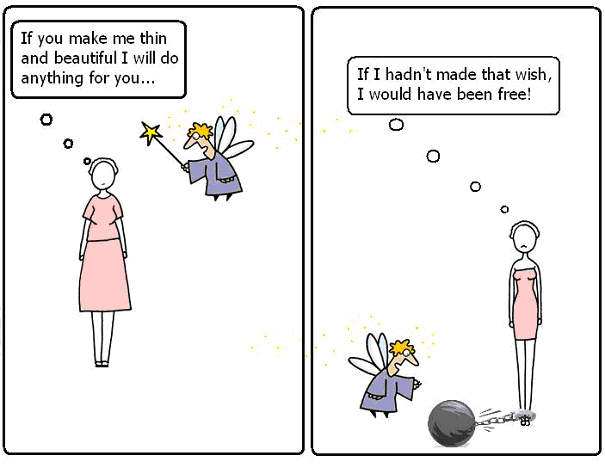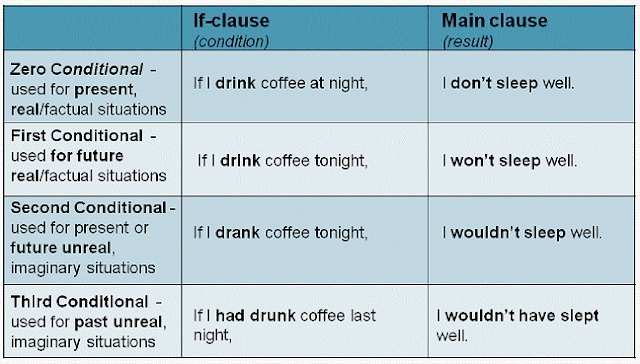A Conditional sentence describes a situation when in order for something to be true a certain condition must be met.
There are three most common kinds of conditional sentences depending on whether we talk about a Future, Present or Past situation.
FUTURE REAL CONDITIONAL
FUTURE REAL CONDITIONAL
FORM If + Simple Present, Will or be + going to + verb base form
USE
We use Future Real Conditional for imagining or guessing about the future. It is called "real" because it is possible that the action might occur in the future.

PRESENT UNREAL CONDITIONAL
FORM If + Simple Past, would + verb base form
USE
The Present Unreal Conditional is used to talk about present hypothetical or imaginary situations. It is used when the speaker speculates about a present situation or something that is impossible.

PAST UNREAL CONDITIONAL
FORM If+ Past Perfect, would have + past participle
USE
The Past Unreal Conditional is used to talk about imaginary situations in the past. You cannot change the situation but you can describe what would have happened if the circumstances had been different.

USE
We use Future Real Conditional for imagining or guessing about the future. It is called "real" because it is possible that the action might occur in the future.

PRESENT UNREAL CONDITIONAL
FORM If + Simple Past, would + verb base form
USE
The Present Unreal Conditional is used to talk about present hypothetical or imaginary situations. It is used when the speaker speculates about a present situation or something that is impossible.

PAST UNREAL CONDITIONAL
FORM If+ Past Perfect, would have + past participle
USE
The Past Unreal Conditional is used to talk about imaginary situations in the past. You cannot change the situation but you can describe what would have happened if the circumstances had been different.

Use of Conditionals
We use these conditionals to:
- Talk about a situation, which you know does not exist or a hypothetical situation: as,
If I had a word processor, I’d finish this in five minutes (but I haven’t got a typewriter)
- To show the effect of a particular constraint on the present situation: as,
If I ate less sugar, I’d lose weight
If I smoked less, I wouldn’t cough so much.
- To give advice: as,
If I were you, I’d give up smoking.
If I were you, I’d quit the job.
- To talk about a common occurrence in the past with the simple past: as,
If we worked overtime, we took Monday off.
If she came home late, he got annoyed.
- To make a request with would: as,
I would be grateful if you would reply soon.
It would save my life if you would give him a lift there.
Other ways of Expressing Conditions:
a) With expression such/as ‘I wish’, ‘I’d rather’ etc
- I wish you were in my position ( = you aren’t in my position)
- I wish you had been in my position ( = you weren’t in my position)
- I would rather you went home now. (a polite suggestion)
- I would rather he hadn’t come (but he came)
b) As if:
- You talk as if you owned the whole country.
c) Suppose/Supposing
- Suppose I find out?
- Suppose they refuse to help?
d) In case:
- Do this in case a fire breaks out.
EXERCISES
1. If you (call) me, I (give) you the address.
2. If I (own) a car, I (drive) to work. But I don't own a car.
3. If she (have) time, she (go) to the party, but she had this project to finish for today and she didn't go
4. Mary (get) the job and moved to Japan if she (study) Japanese in school instead of French.
5. If (there is) nothing on TV, I (read) a book.
6. I (read) more as a child if I (not watch)so much TV. Unfortunately, I did watch a lot of TV, so I never read for entertainment.
7. A: What you do if you (win) the lottery?
B: I (buy) a house.
8. If I (have) more time, I (do) exercise after work.
9. If I (go) to my friend's house for dinner tonight, I (take) a bottle of wine or some flowers.
ANSWERS
1. If you call me, I will give you the address.
2.. If I owned a car, I would drive to work. But I don't own a car.
3. If she had had time, she would have gone to the party, but she had this project to finish for today and she didn't go
4. Mary would have gotten the job and moved to Japan if she had studied Japanese in school instead of French.
5. If there is nothing on TV, I will read a book.
6. I would have read more as a child if I hadn't watched so much TV. Unfortunately, I did watch a lot of TV, so I never read for entertainment.
7. A: What would you do if you won the lottery?
B: I would buy a house.
8. If I had more time, I would do exercise after work.
9. If I go to my friend's house for dinner tonight, I will take a bottle of wine or some flowers.
2. If I (own) a car, I (drive) to work. But I don't own a car.
3. If she (have) time, she (go) to the party, but she had this project to finish for today and she didn't go
4. Mary (get) the job and moved to Japan if she (study) Japanese in school instead of French.
5. If (there is) nothing on TV, I (read) a book.
6. I (read) more as a child if I (not watch)so much TV. Unfortunately, I did watch a lot of TV, so I never read for entertainment.
7. A: What you do if you (win) the lottery?
B: I (buy) a house.
8. If I (have) more time, I (do) exercise after work.
9. If I (go) to my friend's house for dinner tonight, I (take) a bottle of wine or some flowers.
ANSWERS
1. If you call me, I will give you the address.
2.. If I owned a car, I would drive to work. But I don't own a car.
3. If she had had time, she would have gone to the party, but she had this project to finish for today and she didn't go
4. Mary would have gotten the job and moved to Japan if she had studied Japanese in school instead of French.
5. If there is nothing on TV, I will read a book.
6. I would have read more as a child if I hadn't watched so much TV. Unfortunately, I did watch a lot of TV, so I never read for entertainment.
7. A: What would you do if you won the lottery?
B: I would buy a house.
8. If I had more time, I would do exercise after work.
9. If I go to my friend's house for dinner tonight, I will take a bottle of wine or some flowers.
As always, I am leaving the link to the document I used in class........
https://docs.google.com/document/d/1BDpq-0lyqsQwSfV2703lR0JpIZbe3v3QK6SxQnqj-y0/edit?hl=en_US
https://docs.google.com/document/d/15JBZ7lQe40e6Hon5GiYFE92PxbaKGLa0wYdZvm-p2pw/edit?hl=en_US
https://docs.google.com/document/d/15JBZ7lQe40e6Hon5GiYFE92PxbaKGLa0wYdZvm-p2pw/edit?hl=en_US
....and the EGO4U link
http://www.ego4u.com/en/cram-up/grammar/conditional-sentences
I would like to finish with a beautiful thought of one of my heroes..... Mother Teresa of Calcutta
I would like to finish with a beautiful thought of one of my heroes..... Mother Teresa of Calcutta





The Social impact of the Internet
ReplyDeleteAs fast as a close and open your eyes the Internet come to stay and you do like or not, it’s going to be with us for long time.
We know that the Internet Changed our lives, showing us how can we stay as close as to our families or friends each other like press a click in the computer. We can say if anybody doesn't have an Internet connection, that person doesn't exist.
But it’s true the Internet can be dangerous, many people use the Internet to do bad things, such as sending viruses or make dates with teenagers to hurt them. There are so many crazy people around the world that the internet for them is a tool to do their bad things and we can’t say that the internet is bad, because is like we can’t cross the street without watch first. We must be take care always.
To be honest for my the internet changed and will change our lives for long time, giving us new options -I hope that those new options keep out the internet of the predators- that make good thinks our world.
Alex Gutierrez